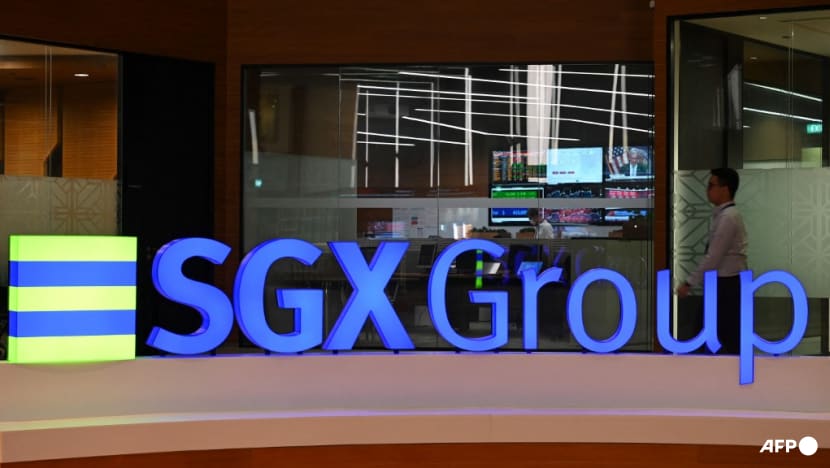Commentary: What would it take to revive Singapore’s stock market?
The path to revitalising the Singapore Exchange lies in making the country a preferred listing venue for regional and global companies, say lawyers Ben Chester Cheong and Yang Eu Jin.

Signage of Singapore Exchange Limited (SGX) is pictured inside the company headquarters in Singapore on Mar 23, 2023. (File photo: AFP/Roslan RAHMAN)

This audio is generated by an AI tool.
SINGAPORE: The Monetary Authority of Singapore’s newly formed review group, tasked with strengthening the development of Singapore’s stock market, has its work cut out for it. With initial public offerings (IPOs) dwindling to a trickle and the spate of delistings in recent years, it’s clear that bold measures are needed to revitalise the bourse.
Singapore and Hong Kong, two of Asia’s most vibrant financial hubs, present a striking contrast when it comes to their stock markets. Despite Singapore’s larger economy, the total value of listed companies on the Singapore Exchange (SGX) is a mere fraction of that on the Hong Kong Stock Exchange (HKEX).
At the end of July, SGX’s market capitalisation stood at US$620 billion, while HKEX boasted a staggering US$4 trillion.
The difference may be because SGX mainly lists local and ASEAN firms and generally lacks the diversity and global appeal seen on the HKEX, which includes Chinese companies and international brands.
Much has been said about boosting retail investor participation to deepen the domestic investor pool. While this may serve certain social objectives such as financial inclusivity and self-reliance in retirement, the harsh reality is that Singapore will always be a relatively small market. Even multiplying local investment several-fold would pale in comparison to the vast capital pools in other global financial centres.
Instead, we believe the path to revitalisation lies in positioning Singapore as a preferred listing venue for regional and global companies, much like how the US exchanges have become magnets for the world’s most dynamic enterprises.
A CONDUCIVE REGULATORY ENVIRONMENT
The US capital markets’ success is anchored not just in the breadth of its domestic investor base, but crucially in their ability to attract the most exciting companies and investors from around the globe. Singapore needs to strive for that same dynamism.
First, Singapore should enhance its regulatory framework to accommodate more innovative company structures and fundraising models. The failure of special purpose acquisition companies and dual-class shares to gain traction suggests the need for even bolder thinking.
One possibility is to create a new board with rules tailored for high-growth tech companies, akin to Nasdaq in the US. This could allow for more flexible listing criteria around financial pre-requisites and governance, while not neglecting safeguards to protect investors.
Allowing crypto and blockchain companies to list, with appropriate oversight, could strengthen Singapore’s position at the forefront of fintech innovation.
It has already been suggested that regulators should act decisively against investor misconduct such as naked short-selling, while adopting a more facilitative approach towards bona fide risk-taking. Introducing corporate governance ratings for small- and mid-cap companies could boost investor trust and participation.
ENHANCING THE LISTING ECOSYSTEM
Second, Singapore should double down on building its pipeline of start-up and growth companies. Expanding schemes such as the Grant for Equity Market Singapore, the Anchor Fund@65, and enhancing support for small- and medium-size enterprises eyeing a listing can ensure a steady stream of local companies going public.
Efforts to make Singapore the listing venue of choice for regional start-ups should also be ramped up. This can be done through targeted tax incentives, co-investment funds to anchor IPOs, and aggressive outreach to venture capital and private equity firms. Pulling in more Asian “unicorns” will create buzz and build a critical mass of growth companies.
Third, Singapore should strive to be a gateway for global capital to access Asian growth opportunities. It can achieve this by actively courting the listings of major Asian companies based overseas and encouraging secondary listings of Asian companies already listed abroad.
Creating the right ecosystem of index providers, research houses and market makers to facilitate investment and price discovery in these stocks will also be key. Singapore already serves as an Asian hub for global banks and asset managers - it should leverage these relationships to drive the participation of global institutional investors.
While a merger with another bourse may not be the optimal solution, SGX could still benefit from pursuing strategic partnerships and alliances with other exchanges and market participants.
For example, SGX could explore joint ventures or reciprocal listing arrangements with other exchanges in the region, such as those in Malaysia, Indonesia or Thailand. These partnerships could provide a pathway for companies to tap into multiple markets and investor bases, while still maintaining a primary listing in Singapore.
Fourth, while the specifics of SGX’s internal incentive structures are not fully transparent to outside observers, some have commented that aligning the management’s key performance indicators more closely with the overall growth and development of the Singapore stock market could yield positive results.
BOOSTING INVESTOR PARTICIPATION
Finally, sustained efforts should be made to boost retail investor education and participation. Expanding financial literacy programmes and investment awareness campaigns can help shift attitudes towards equity investing. Allowing Central Provident Fund investment in a wider range of locally listed securities and exchange-traded funds can also encourage more active participation.
Japan’s Nippon Individual Savings Account is a government tax-free stock investment programme for individuals. Although Singapore does not have a capital gains tax on stock investment for Singaporeans, perhaps an individual tax rebate may help to channel more of Singapore’s substantial household savings into the stock market.
Rejuvenating Singapore’s stock market is a complex challenge with no quick fixes. The review group has an opportunity to redefine Singapore’s capital markets for the future. With creative solutions and collective willpower, it can build a vibrant investment ecosystem that places SGX back at the centre of Asian finance.
Ben Chester Cheong is Law Lecturer at Singapore University of Social Sciences and Lawyer at RHTLaw Asia. Yang Eu Jin is a Partner & Co-Head of the Corporate & Capital Markets Practice at RHTLaw Asia.



















